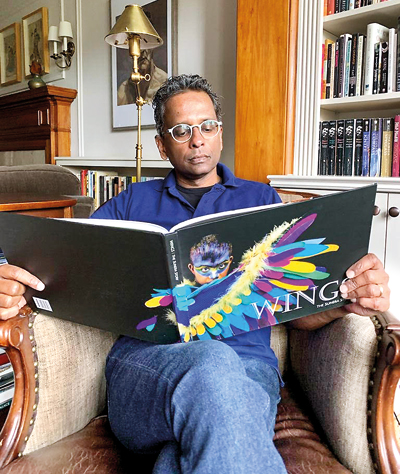Human connection is the essence of life

Shyam Selvadurai perusing Wings: A story of hope
Wings, the new book celebrating the 20th anniversary of the Sunera Foundation, is the affecting story of the organization’s history and the work they have done with the disabled community in Sri Lanka. Founded in 2000 by Sunethra Bandaranaike, the organization has produced theatrical performances, showcasing the talents of differently-abled Sri Lankans, and runs 38 weekly workshops for people living with disabilities across the country. They use the performance arts as a therapeutic tool and aim to create a space where participants are free to express themselves without judgment.
In affecting story after affecting story, we see how these weekly workshops are so looked forward to by these differently- abled people, some of whom live in situations of isolation and stigma in their own communities. For these people, the workshops represent a chance to feel seen and to express their creativity. To feel fully alive. Affecting too are the stories of how the workshops have changed these people and also their families, allowed them to see their self worth in their own terms.
In Wings, Sunethra Bandaranaike, discusses how entering this line of work “challenged her every preconception” about people with disabilities. She admits she was used to thinking of people with disabilities as being “in need of care.” Yet through her work at the Foundation, she came to recognize the immense value they themselves offer to their loved ones and the larger community. The people with disabilities who have worked with the Sunera Foundation are, in the words of Bandaranaike, “uninhibited… with near electric grace… and full of joy”.
Reading of the love families have for their disabled members, the efforts they go through to protect and enrich their lives—and how in turn these differently-abled family members enrich their families—made me think of how these stories challenge the late-stage capitalist world we live in. The current system and ideology insist that a person’s value is determined by how much they contribute to GDP, offset by the money required to care for and sustain them; wealth-generating activity is considered the wellspring of human value. But, as the philosopher Martha Nussbaum put it so well: “Thinking about (human) contribution in (economic terms) is much too narrow… There are different kinds of contribution– life experience, understanding… being objects of love in families– that enrich all of our lives”. The stories of these individuals and their families ring true to her words and remind us of what makes life truly meaningful: the rewards of caring for and the comfort of being cared for; the pleasure of running with a creative impulse; the glow of shared laughter; the moments where we recognize our interdependence and do not shrink from it, but rather, are grateful for it; the gift of knowing unselfish love.

Finding friendship and acceptance through Sunera
In the midst of my isolated pandemic anxiety I felt grateful to encounter this over and over again in the book; felt both soothed and energized by how the book reminded me of that most essential aspect of a good life: human connection.
Wings also offers the reader a sense of hope with regard to broader political conditions in Sri Lanka. Sunethra Bandaranaike discusses how she worried that there would be serious problems making performers from both sides of the ethnic divide engage with each other. Yet she found that over the course of their ardent, tireless preparations for productions, members of the cast who had struggled to relate to each other, began to find they had more in common after all. And in the process a family was forged. Being in each other’s presence, working towards a shared goal, the performers came to care for each other, despite the political climate demanding they do not. There was something so hopeful about this story: a signal that it is possible to put our differences aside in service of larger aims.
The relationships in this book show that what we give and take from each other is not fully determined by the larger systems at work around us. People are more than their disabilities as well as their politics; and our lives are given their truest value and meaning in our ability to relate to, care for, and connect with each other.



